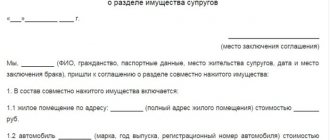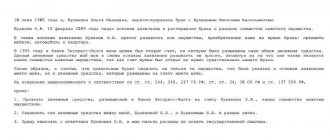What property remains entirely with the children and is NOT divided during a divorce?
The property that was bought for the child is his personal property and is NOT SUBJECT to division. It is transferred to the parent with whom the children will remain after the divorce.
What is the personal property of the child(ren)?
- Toys;
- Sport equipment;
- Musical instruments;
- Bank accounts opened in the name of the child (children);
- Apartment registered to the child;
- Share in the apartment, if it was allocated for children when registering real estate;
- An inheritance passed to a child (for example, under a will from a grandparent).
The disputed property includes a laptop and computer. It cannot be said outright that it was bought “for study.” As a rule, all family members use it. Therefore, electronics can be excluded by the court from the personal property of children.
What is the personal property of each spouse?
In turn, family law (Article 36 of the RF IC) lists the types of property that belong solely to each of the spouses and are not subject to division, except in cases where the spouses voluntarily agree to divide some other property by drawing up a marriage contract.
So, the personal property of each spouse should include:
- Personal items (shoes, clothing, personal belongings);
The only exceptions are luxury items and jewelry, which, although in the individual use of one of the spouses, can be classified as joint property - we mentioned this above.
- Anything that was acquired before marriage (or during marriage, but with funds accumulated before marriage or proceeds from the sale of personal property owned before marriage);
- Everything that was received by inheritance (before marriage, during marriage, after divorce);
- Everything that was received by one of the spouses on the basis of primary privatization (individually);
- Everything that was accepted as a gift (before marriage, during marriage, after divorce);
Often a dispute arises between spouses regarding the division of “gifts”, and the conflict becomes especially acute if we are talking about valuable property, for example, real estate, the acquisition of which is formalized in the form of a gift agreement. Such a dispute is resolved in court - by studying all the circumstances of the transaction, including the identity of the donor (for example, if it turns out that the “gift” was made by a stranger, the transaction may be recognized as feigned or fictitious - in order to avoid the subsequent division of the donated property). Often spouses try to achieve division of gifts given to each other. But property donated by spouses to each other remains the property of the gifted person and cannot be recognized as joint.
linked with the personality of one of the spouses cannot be divided
- Rights to the results of intellectual activity (according to Article 1128 of the Civil Code of the Russian Federation).
- Targeted income, for example...
- maternal capital;
- state award,
- Prize for personal merit and achievements in the field of science, art, sports,
- cash payments and benefits in connection with injury or injury;
- monetary payments or property received by one of the spouses as compensation for damage to other personal property or for moral damage caused;
- insurance payments (sums of money) received by one of the spouses as a result of the occurrence of an insured event provided for in a compulsory or voluntary insurance agreement.
However, a caveat should be made here too. For example, insurance payments under an insurance contract may belong to one of the spouses only if the insurance premiums under the insurance contract were paid by him from personal funds (which will need to be proven). If the insurance premiums came from the family budget, the payment under the insurance contract can also be considered the joint property of the spouses.
Special mention should be made of property belonging to minor children . This can be both real estate and movable property: clothes and shoes, furniture, school supplies, musical instruments, sports equipment, a library, as well as funds deposited by spouses in a savings bank account opened in the name of a minor child. All this does not apply either to the personal property of the husband or wife, or to joint marital property, and therefore is neither divided nor becomes the property of one of the spouses. This property remains the property of the children, but the parent with whom the child will live after the divorce can own and manage it until the child reaches adulthood.
Recognition of personal property as joint property of spouses
So, we have looked at what belongs to joint marital property and what to personal property of each spouse. It's time to list the exceptional cases when personal property can be recognized as joint property and vice versa. We must immediately stipulate that such a change in the legal regime is possible in two ways:
- By contract (by concluding a marriage contract between husband and wife);
- Judicial (by filing a claim and written evidence confirming the legal grounds for the transfer of one or another property into joint ownership and subsequent division).
So, according to Article 37 of the RF IC, the personal property of a husband or wife can become the joint property of the spouses if, during their married life, it has been improved through joint efforts or the investment of joint funds, as a result of which its final market value has increased significantly compared to the original .
Example: A wife inherited a suburban house from her father. After marriage, the house was renovated by the husband using joint income: the house was remodeled, sewerage and gas were installed, the roof was updated and the surrounding area was landscaped. All this significantly increased the market value of the old building. Without waiting for a possible divorce, the husband filed a lawsuit to recognize the joint ownership of the house, attaching evidence such as photographs and videos, witness statements, work contracts, receipts for the purchase of building materials. In the claim, the husband indicated the value of the house, determined by the assessment of the inherited property, and the value determined after the renovation of the house. Based on the results of the consideration of the claim, the court established an increase in the cost of the house by more than 1/3, which, according to Article 256 of the Civil Code of the Russian Federation, is considered significant, and satisfied the husband’s claims.
This topic is covered in more detail in the articles: “How property is divided during a divorce if the wife is the owner” and “How property is divided during a divorce if the husband is the owner.”
The opposite case is the transfer of property acquired in a legally registered marriage from joint ownership to personal ownership. According to clause 4 of Article 38 of the RF IC, this is possible if the acquisition was made during separation and with the marital relationship actually terminated. As a rule, the regime of personal property in such complex cases is established exclusively in court.
Example During a marriage that was not dissolved, but while living separately from her husband, the wife profitably bought an inexpensive house in her parents’ village.
The husband had not lived with his family for several years now, since he had acquired another “common-law” wife and did not take part in the life of his legal wife and children born in the marriage. Thus, the purchase of the house was completed during the actual termination of the marital relationship, which was proven in court by witness testimony and documentary evidence, and therefore was recognized as the personal property of the wife. Attention!
- Due to frequent changes in legislation, information sometimes becomes outdated faster than we can update it on the website.
- All cases are very individual and depend on many factors. Basic information does not guarantee a solution to your specific problems.
That's why FREE expert consultants work for you around the clock!
- via the form (below), or via online chat
- Call the hotline:
- Moscow and the Region
- St. Petersburg and region
- FREE for a lawyer!
By submitting data you agree to the Consent to PD Processing, PD Processing Policy and User Agreement.
Anonymously
Information about you will not be disclosed
Fast
Fill out the form and a lawyer will contact you within 5 minutes
Tell your friends
Rate ( 1 ratings, average: 5.00 out of 5)
Author of the article
Irina Garmash
Family law consultant.
Author's rating
Articles written
612
How is an apartment divided during a divorce if there are children?
This is the most pressing issue that arises when dividing property. And in our case, everyone is interested in what share children are entitled to and what determines its size?
Let us explain the main situations that spouses face when dividing property.
How is property divided during a divorce with children if the apartment has a mortgage?
If you are “involved” in a mortgage, then without the bank’s “permission” you will not be able to sell the apartment or divide it. Since until the mortgage loan is repaid, the apartment is pledged to the bank.
Therefore, during a divorce and division of property, you must first agree with the bank on acceptable methods of division. In addition, this condition (to notify the bank of the divorce) is stated in your mortgage agreement.
If children are registered in the mortgaged apartment, BUT they are NOT ALLOCATED shares, then when dividing the property they DO NOT claim the apartment. Both husband and wife share the apartment only among themselves. If the shares are ALLOCATED to the children, then these shares will completely belong to the children. And the parents will divide the rest among themselves.
We looked at the section specifically on shares. Well, who will continue to pay the mortgage loan to the bank is decided through negotiations with the bank.
There are several options:
- The loan is divided into two. Those. Instead of one mortgage agreement, two are drawn up. And everyone then pays for themselves.
- The loan is transferred to one person.
- The apartment is sold, the debt to the bank is paid off, and the remaining money is divided between the husband and wife (with the direct participation of bank representatives).
For more details on all the nuances of the mortgage section, WITH EXAMPLES, read our article >> here!
How is property divided during a divorce with children if the apartment is owned?
If you own the apartment, then there are two options:
- The apartment has been privatized.
- The apartment was purchased under a sales contract or was inherited.
If the apartment was privatized and the children did NOT participate in the privatization, then they have no rights to the apartment. If all family members participated in privatization, then the apartment will be divided between them in equal proportions.
If the apartment is privatized only for the husband, but the whole family lives, then according to the law, the owner of the apartment will be exclusively the husband. And the apartment, even if there are children, is not divided. We want to reassure you right away that no one will “throw children out onto the street.” But the wife will not have any right to this apartment. If the children, by court decision, remain with her, then they may be allowed to continue to use this apartment (live in it, but not be the owners).
If the apartment was purchased under a sales contract, then it does not matter to whom it was registered. For both spouses or for one person. According to the law, the apartment is still “shared”. And here, when dividing property and if there are children, the court can transfer to the wife a larger part of the apartment than the husband. For example, 60% for the wife and 40% for the husband. Article 39, paragraph 2 of the Family Code of the Russian Federation gives the judge this right. The judge may exercise his right to redistribute shares, or he may refuse to do so for the spouses.
This depends on many factors: the presence of premarital real estate in each of the spouses, on the financial status of the husband and wife, on the health of the children (presence of chronic diseases).
Documents attached to the claim for division of property during divorce
- Statement of claim in several copies (according to the number of parties participating in the process).
- Documents about marriage (if divorce has already occurred, then a certificate from the registry office stating that the marriage was previously concluded) and about divorce.
- If there are minor children, then their birth certificates.
- All title documents for joint property. These can be sales and purchase agreements, receipts, checks, bank statements, USRN extract , and any other documents that can prove the fact of acquisition of joint property.
- If the plaintiff, even before filing the claim, assessed the disputed property - an act of independent assessment.
- Receipt for payment of state duty.
How is an apartment divided when dividing property if maternity capital is used?
When purchasing an apartment using maternity capital, there is a MANDATORY condition for allocating a SHARE to children in the apartment being purchased. Thus, the state insures children against misuse of maternal capital by their parents. The children's shares remain with the children, but the remaining part is divided between the husband and wife in equal proportions. Or the court may deviate from equality of shares.
Those. the share of children in a divorce and division of property (when using maternal capital) must be allocated!
Since this topic (purchase with maternity capital) is very large, we wrote a separate article.
It contains all the methods of the section, describes the sequence of actions, explains how to build communication with the guardianship and trusteeship authorities, as well as with the bank that issued the loan. “Examples from life” are given.
Read this article at this link >> here!
Options for dividing property if there is a child in the family
The most complex legal processes arise during the division of property if there are minor children in the marriage.
First option. When a child has a legally allocated share of real estate
- when using maternity capital to purchase housing, the child is allocated a share of the property. It is not subject to division at the time of parents' divorce. Moreover, this share remains with him regardless of which relative he subsequently lives with;
- when a share in an apartment or house is registered in the name of a child under a gift agreement from older relatives;
- when funds belonging to a minor by right of inheritance or under a gift agreement were invested in the purchase of real estate.
Examples
- 1. At the time of purchasing an apartment, ownership rights are assigned to the spouses in equal shares. A year before the divorce, the mother executed a gift agreement and, with the consent of the child’s father, transferred her share of the living space to her son. During the divorce, only half of the property belonging to the father was divided. In this situation, it is important to provide documents confirming the fact that the child owns a share of the property. This information can be found in the EGRN extract from Rosreestr, which contains information about all actions that have ever been performed with the apartment.
- 2. When purchasing an apartment, funds from his account, which he received as an inheritance from his deceased grandfather, were used to improve the child’s living conditions. The guardianship authorities gave permission to use the money of a minor family member, and the child was allocated his share during registration. A few years later, my father tried to sue half of the purchased housing, but in the end he was refused. As you know, a child’s share of housing is not subject to division. It is not necessary to prove the fact that the apartment was purchased with money that belonged to the minor. The EGRN extract from Rosreestr will already indicate information that the child owns a share of the property.
In both cases, the documents provided by the participants in the proceedings were important to the court.
An important point is that if a child owns a share of housing, he cannot independently dispose of it until he reaches adulthood. In this regard, any action performed with the real estate of children occurs only with the permission of the guardianship and trusteeship authorities.
The state has one requirement here: when exchanging, selling or re-registering an apartment or house, the child’s rights guarantee him living conditions (or ownership) that do not worsen those that exist. This is why difficulties often arise with the physical division of an apartment during a divorce if part of it is registered in the name of a minor.
Example
In a two-room apartment subject to division, 1/3 of the share belongs to the husband, wife and 10-year-old son, who has a separate room. Only 2/3 of the area falls under the court decision, and a third remains the child’s asset. Exchanging such housing is problematic due to the need to provide the child with similar living conditions, so most often the spouses agree to pay compensation or replace part of the apartment with some other property.
In addition, the court may even order the division of real estate during a divorce for the following reasons:
- In addition to spouses and children, other relatives who have shares in the property (grandparents, brothers) also live in the apartment;
- the apartment in which the minor lives is very small, and its size will not allow social space standards to be met.
Second option. Property in which children do not have an allocated share is subject to division.
A parent with whom minor children remain to live can submit an application and increase the size of the share of real estate allocated to him up to 10% for each child. Thus, if there are two children, in the event of a divorce, he will receive not half, but 70% of the apartment or house.
This applies to any property that is subject to division in a divorce. The mother of a minor remaining in her care may receive an increased share if she points out special circumstances in court:
- she is on maternity leave and is unable to earn money to support the child;
- a disabled child in need of care remains in the care of the mother;
- if the divisible property is the only one, and its exchange worsens the living conditions of the children, then it goes to the one who takes care of the children (most often the mother). At the same time, the compensation that she will have to pay to her husband for his share of the apartment, under certain conditions, the court may reduce by 30-40%.
Important! When determining the amount of compensation due to one of the spouses, it is advisable to involve an independent expert before filing a claim in court. This will help avoid disagreements, speed up the process of making a judicial decision and allow the interests of both parties to be respected.
How can you avoid being left homeless with your children if your husband owns the apartment?
In this case, the apartment is the personal property of the husband and is not divided during the division of property. Neither children nor wife can claim it. Accordingly, a woman has questions: “Where to go, where to live? What will happen to the children?
We hasten to calm you down. If the wife does not have another home or does not have the financial ability to buy a new home, the court may allow her to continue to live in her husband’s living space. Or give her a period of six months to a year to find a new home.
As for children, the guardianship and trusteeship authorities will not allow the husband to “worse” the children’s living conditions. And they will continue to live in their father’s apartment.
Plus, minor children have the right by law to use the living space of both spouses after a divorce.
You can read the article >> here!
Division of property in case of divorce with children by agreement of the parties (settlement agreement)
When mutual understanding is reached between the former spouses and all property, including real estate, is distributed according to mutual agreements, it is enough to sign a settlement agreement. It must indicate:
- information about the parties to the agreement;
- presence of a minor child (children) in the family;
- a list of jointly acquired property subject to division - when including real estate and expensive things (for example, a car), it is better to indicate their value;
- shares of each spouse;
- information about property officially registered in the name of the child (received by inheritance, under a gift agreement, etc.);
- information about property allocated by parents to children;
- rights of the parties, any additional terms of the agreement.
When dividing property, the notary will need an extract from the Unified State Register of from Rosreestr. Order it on the N.Reestr website. The report contains complete information about the property and its copyright holders. The document speeds up legal proceedings, even if a settlement agreement has been concluded.
If one of the parties refuses to fulfill the terms of the agreement, the second has the right to file a claim in court.
Who will get the car during the division of property if the children remain with their mother?
Since when dividing property, a car cannot be “cut up,” it is either sold and the money is divided among themselves, or it is left to someone alone, and the other receives monetary compensation.
If there are children in the family, then the division of property, in this case a car, more often occurs in favor of the one with whom the children will remain.
Quite often, a wife needs a car to take children to school or kindergarten, plus to classes and clubs. And the judge takes this into account.
But at the same time, if the husband needs a car for work and income, from which he, by the way, will pay alimony, then the judge takes into account this nuance.
Which way the scales swing when the judge makes a decision will largely depend on the argumentation of the husband and wife, and the work of their lawyers.
Read our separate article >> “3 ways to divide a car during a divorce”
Features of the division of jointly acquired property in the presence of children
So, the marriage partners decided to get a divorce, they have young children, but there is no prenuptial agreement. How will their property be divided? The Family Code interprets this situation unambiguously: common assets acquired during the marital relationship will be divided. All other property is considered personal and cannot be divided.
Joint property assets include not only the income of the wife or husband, but also property purchased in the name of either spouse. Moreover, it does not matter which of the marriage partners bought this property. This means that, for example, a husband can purchase an apartment with common income and register it in his wife’s name, but according to family law this apartment will be considered joint property and not the property of the wife.
The legislator considers general assets to be:
- Real estate, including those purchased with a mortgage or with the help of maternity capital.
- Cash received from entrepreneurship and investments.
- Wages.
- Royalties and royalties.
- Movable things (household appliances, cars).
- Units and shares in legal entities and credit institutions.
- Bonds and other securities.
- Benefits and pension payments.
- Funds allocated by government agencies and other persons as financial assistance.
- Deposits in banking institutions.
The legislation defines personal assets as:
- Items received as part of inheritance or gratuitous contracts (barter or donation).
- Things that the spouse had before the wedding in the registry office.
- Cosmetics, shoes, hygiene items, clothing and other personal items, except luxury items or precious items.
- The right to be called the author of an intellectual work in the field of literature, art, inventions, etc.
- Outstanding maternity capital (for women).
If, for example, a wife invested money or her own labor in renovating a home that is her husband’s personal property, and thereby significantly increased its market value, then in court during a divorce she can get this home recognized as a joint asset. It is the judge's prerogative to assess whether the market value has increased significantly or only slightly.
Spouses must take into account that the property of minors, which the law includes children's books, sports equipment, shoes, hygiene products, clothing, instruments for music lessons, as well as deposits registered in the name of a young child, cannot be divided upon divorce. The property of the minor is transferred to the parent with whom he will live after the separation of the father and mother. At the same time, the other parent cannot demand compensation for the children's property.
When resolving a property dispute, the court proceeds from the estimated value of the assets owned by the parties to the divorce proceedings at the time of its consideration. This means that a spouse cannot increase the total property mass, citing the fact that the other spouse intends to purchase something in the future with family money, for example, real estate or household appliances.
In addition, family law protects the property interests of a bona fide marriage partner. If the husband (wife) proves to the judge that the second spouse hid part of the common property, donated, exchanged or sold it without obtaining the approval of the other half, and also spent financial resources as he saw fit, without taking into account the will of the conscientious spouse, then this property is taken into account judge when dividing it.
If the above paragraph becomes known to the ex-spouse, then he has three years to make claims against the unscrupulous former marital partner.
In the event that the property transferred to the spouse at its estimated value exceeds the value of his share, the court obliges him to pay the difference to the second spouse in money or other property.
What if the child is disabled or incapacitated? How will this affect the division of property?
The division of property if children have disabilities or if the child is incapacitated is carried out according to general rules. Children do not claim the property of their parents.
But the redistribution of shares between spouses will be significant. The spouse with whom the children remain will be awarded a larger share in the property compared to the other spouse.
No one will evict a child from an apartment without providing alternative housing.
The car will most likely be left to the parent with whom the child will remain after the divorce.
Division of property in case of divorce with children when filing a claim in court
The ideal option for dividing property if there are small children in the family would be to conclude a settlement agreement. However, judicial practice shows that not all spouses can reach mutual understanding even at the preliminary stage of negotiations. In such a situation, they have to divide the property through the court.
Certain nuances regarding the protection of the interests of minor children during parental divorce are stipulated in family law and the Civil Code and relate to the following issues:
- determining the size of the share of the spouse with whom the child remains to live;
- establishing the amount of compensation for indivisible objects to the parent and reducing it for the one who takes care of the child;
- allocation of a share of property (real estate) if maternity capital or funds belonging to the child by right of inheritance or gift were used for its purchase.
Divorce with division of property and a minor child does not have a single algorithm for making decisions on the size of shares of jointly acquired property for each party. The court will have to determine the fairness of the parents' demands and compliance with legal norms based largely on evaluative criteria:
- the child’s health status - if he has a confirmed disability or documented systemic diseases, the share of the caring parent may be increased;
- the presence of health restrictions, lack of income for objective reasons (the status of a caregiver - a person caring for them) of the spouse with whom the child lives;
- the need for increased funding aimed at supporting the development of the child - for example, expenses for sports clubs, payment for music education;
- the physical participation of the second spouse in the lives of the children - his involvement in their development, trips on vacation.
Example: When a couple divorced, a boy with cerebral palsy remained in the care of his mother. Due to the fact that his condition required regular travel to visit a rehabilitation center, the car purchased during marriage went to the child’s ex-wife. The husband received compensation, but the amount, taking into account the special condition of the child, was reduced and did not become a serious burden for the mother.
All this applies to property acquired in a joint marriage by parents. But there are things that the court will consider the personal property of a child, even a minor.
What difficulties will you face? Solutions
First difficulty: In case of divorce and division of property with children, you will have to communicate with the “Guardianship and Trusteeship Authorities”. They ensure that the children's living conditions do not worsen when their parents' marriage is dissolved.
It is better to be “friends” with guardianship representatives than to “fight.” If the apartment is divided, every step will need to be coordinated with them. Without their permission, you won’t even take a step.
We recommend that you consult with a lawyer and first develop a general strategy for dividing your property. And then, coordinate it with the guardianship and trusteeship authorities.
Second difficulty: Division of property in the presence of a mortgage with children, especially when using maternity capital.
In addition to the guardianship authorities, the difficulty lies in communicating with the bank that issued your mortgage loan. The bank sets the rules and methods for dividing a mortgaged apartment. He is the main character.
It will be necessary to analyze the mortgage agreement together with a lawyer and negotiate with the bank. And after that, approve the scheme for dividing the mortgage apartment, and also decide who will continue to repay the loan.
Our lawyers have gained good experience in resolving such issues. Consult us.
How to recognize personal property as joint property
Property owned personally by one of the spouses can be recognized as joint property in court or through an agreement. In the first case, you will need to draw up a statement of claim, collect documents and contact the judicial authority.
The second option requires the ability to negotiate between husband and wife. The settlement agreement is drawn up in writing and certified by a notary.
If difficulties arise, please seek legal advice. You can get free legal assistance on our website. in a special window.
So now you know what is considered marital property in a divorce. The personal property of a husband or wife can also become joint property if, during the time they lived in a legal marriage, it was improved by common efforts and money.
Recognition of the sole property of a spouse as common marital property
Article 37 of the RF IC determines that in the case when the sole property of one spouse has been improved (repaired or reconstructed) during the period of family life so much that its value has increased significantly, such a thing is recognized as a family property and is divided during a divorce.
In this case, improvement should occur due to:
- general marital means;
- the other spouse’s own money;
- labor investments of the other spouse.
However, this does not mean dividing such a thing equally between husband and wife. The court examines the question of how much money or labor was invested by the other spouse (how much the price of the thing increased), based on this data, the share of each is determined. As a rule, the one to whom the item originally belonged receives a larger share.
Separation options
In the legislation, the division of jointly acquired property is not mandatory in a number of cases. But, in order to avoid possible further disputes between former spouses, it is recommended to consolidate the fact of the agreements reached.
The following separation options are available:
- conclusion of a settlement agreement in the absence of disputes. It is important to have this document certified by a notary, otherwise it has no legal force;
- through the judiciary. The conflict over the division of property acquired during marriage will be resolved by an accepted and binding decision;
- according to the terms of the marriage contract in case of divorce.
Rules and procedure for drawing up an agreement
An agreement on the peaceful division of joint property between spouses is drawn up during an existing marriage, upon filing an application for its dissolution or upon completion of the divorce procedure.
It is worth approaching the drawing up of the agreement responsibly, accurately and completely, indicating in detail all the necessary data and shares due to everyone.
To be filled out as follows:
- place (city) and date of preparation, full names of the spouses - parties to the agreement;
- describe the civil status (at the time of compilation) of the applicants and list all property acquired during the marriage;
- it is clarified how the division occurs, what exactly and in what amount (other expression) is transferred to which of them is used;
- the conditions and terms for the transfer of property to be divided are specified;
- indicate in as much detail as possible everything that relates to indivisible property (that is, what is not jointly acquired);
- indicate that the document comes into legal force from the date of its certification by a notary;
- in conclusion: the number of copies drawn up, the procedure for possible amendments (additions) to the agreement and consideration of disputes regarding the execution of clauses of the agreement, signatures of both parties (with transcript).
Must be certified by a notary.
Through going to court
The issue is resolved in court in the case where the registration of relations took place without concluding a marriage contract and there are disagreements between the participants in property proceedings.
If there are young children, divorce must be done through the courts.
- Grounds for ending a marriage in court
This is provided to ensure the rights of the child. At the same time, all property registered in the name of the minor remains at his personal disposal, otherwise it is transferred free of charge to the parent with whom the child will live.
The presence and consent of representatives from the guardianship and trusteeship authorities at the court hearing is mandatory if property (real estate) that is owned by a minor or is his place of residence is alienated.
Initially, the entire composition of both personal and joint property is established. Only then is it distributed, taking into account the interests of each of the parties (including children) according to the principle of equality and within the framework of the law.
If it is impossible to physically separate into equal components (without loss of functionality):
- The parties agree on who will now own the property, its value (by mutual agreement or according to the conclusion of an appraiser) and the amount of payment of monetary (or in kind at the expense of another item) compensation to the one who did not receive it. One-time repayment is optional; phased repayment is allowed (this requires additional indication in the document);
- If agreement is not reached, then shared ownership arises (the court has the right to determine the order of use) in equal proportions (one to two);
- If it is impossible to allocate shares for the subject of the dispute, the court alone makes a decision on the new owner, taking into account the need and possibility of direct use.
It is also possible to increase or decrease the spouses' share of property acquired during marriage. The rules and procedure for determination are established by the norms of family law.
Circumstances such as:
- residence of a minor child after the parents’ divorce (with which of them);
- the occurrence of an illness or long-term period of disability due to the performance of one’s duties as a family member (arising during marriage);
- fulfillment of common obligations by only one spouse;
- lack of income due to unwillingness to work;
- intentional (or careless, negligent) actions aimed at reducing the value of property or damaging it;
- irresponsible behavior, as a result of which the debt is paid from the general family budget (except for offenses where responsibility is personal).
- Who pays what state fee during a divorce?
Documents will be required: a statement of claim for the division of property, passports of spouses, birth certificates of children, existing documents for disputed objects, official forms for registration and divorce, a document confirming payment of state fees.
Methods for dividing joint property
There are several main ways to divide property between spouses, depending on what type it is:
- Ransom. One of the spouses buys out the share of the other by paying monetary compensation. Suitable for those objects that one of them does not need and which he agrees to give up in exchange for a reward.
- Exchange. One of the spouses exchanges one property for another. Possible only with mutual consent.
- Isolation in kind. The property is actually divided into two parts, remaining for the use of each party. Suitable for business, residential building or land.
- Sales and division of proceeds. The property is sold to third parties, and the proceeds received are divided between the parties in accordance with their allotted share. Suitable for any subject, but mutual consent is required.
Recognition of property as joint property
The procedure for recognizing things as jointly acquired is carried out in court at the request of an interested party. According to the law, the initiator is obliged to prove that the property was acquired during marriage.
The basis for filing a claim is the investment of funds or the family budget in order to increase the value of property acquired before the formation of the family, by inheritance or under a gift agreement.
How to prove that property is not common?
During the trial, defendants often have to prove that the property is their personal property. The main evidence is an extract from the Unified State Register of Real Estate, if we are talking about real estate. If it was purchased before the family was created and no investment was made by the initiator, the court will most likely refuse to satisfy the claim.
Evidence may include:
- bank statements indicating the fact of spending personal funds by the defendant;
- witness's testimonies;
- receipts and checks.
According to the law, personal belongings cannot be divided, and the court will refuse to separate them. Therefore, the defendant will not have to present evidence of the purchase of clothing or shoes at the expense of the initiator; they are not included in the total amount of the claim.
Are you tired of reading? We’ll tell you over the phone and answer your questions.
Property donated during marriage
Objects received free of charge while the marriage is still valid are in most cases recognized as the personal property of the recipient.
The donated property can even be an apartment. Such cases are possible when a close relative wants to make a gift, and tax contributions are completely excluded from both the recipient and the donor. When there are no family ties, then thirteen percent will have to be paid. Anyone who received real estate in this way and decided to sell it within three years from the date of registration is also required to make a contribution to the treasury. The donated property is not subject to any division between the parties, and the time of affixing the stamp in the passport does not matter. The owner can evict the ex-husband/wife at any time, even if there is official registration in the given premises. The fact of donation is considered completely legal if it is executed in accordance with all established rules. There are exceptions where a gift is not considered individual property. These are cases when a deed of gift is drawn up by one of the spouses, the second must confirm his consent in writing; if not, the transaction is not considered valid.
Confirmation from parents whose children have not reached the age of eighteen and have given any type of real estate as a gift is required. If a parent gives a house/apartment to a child, the agreement of the second representative is not necessary. In cases where part of the real estate is donated, confirmation is required from the owners of the remaining shares.
Attention! Due to recent changes in legislation, the legal information in this article may be out of date! Our lawyer can advise you free of charge - write your question in the form below:
Deadlines for division of property
The Family Code (Article 38, paragraph 7) establishes a three-year statute of limitations for filing a claim to resolve property conflicts between members of a former married couple.
It is worth noting that the countdown does not start from the date of divorce (by a court decision or registration of an entry in the registry office), but from the moment the violation of the rights of one of the parties to the dispute is revealed. This is evidenced by the 15th Resolution of November 5, 1998 (19th article) and 200th article (1st paragraph) of the Civil Code of the Russian Federation.
The fact that the second spouse evaded the division of such jointly acquired property must be proven in court (additionally, according to the statement of claim), by providing supporting information. During the period of proceedings on the identified disputed objects, the division case is subject to suspension.
The following concealment options have become widespread:
- registration of expensive objects for relatives;
- purchase with funds donated by relatives (a fictitious gift agreement is registered in advance);
- secret investment of common property in valuables (including shares, bank deposits, acquisition of foreign currency cash);
- purchases with funds allegedly received under a loan agreement and returned after a divorce by one of the former spouses (thus, the total debt of the family was paid individually and gives grounds for refusal to divide the property acquired during marriage).
Division of common property through court
According to the law, two methods of division are allowed:
- through the court in case of disagreements;
- conclusion of an agreement by agreement.
When concluding a marriage contract, division is made in accordance with its provisions.
You should go to court if there are disputes. The procedure looks like this:
- The initiator determines what will be divided, draws up and submits a statement of claim.
- The claim is accepted for proceedings within 5 days, the judge makes an appropriate ruling.
- The parties receive written notices with the date of the first meeting.
- In a magistrate's court, proceedings are resolved within one month, in a district court - two months.
- Based on the results, a court decision is made that determines the amount of shares or compensation.
You have 1 month to challenge the decision on appeal. After this, it comes into force and can be presented to Rosreestr for re-registration of shares or to other organizations to change owners.
Read more about division through the court here.
Jurisdiction and limitation period
If the claim price is up to 50,000 rubles. documents are submitted to the magistrates, in other cases - to the district courts at the location of the property. If the division is carried out simultaneously with the dissolution of the union, the initiator has the right to use Art. 29 of the Code of Civil Procedure of the Russian Federation and file a claim at your place of residence for good reasons: being a dependent minor, illness, etc.
The general statute of limitations is 3 years. The calculation begins from the moment the spouse learned of a violation of his rights or the possibility of division by law.
Contents of the statement
The claim must comply with the provisions of Art. 131 Code of Civil Procedure of the Russian Federation and contain the following data:
- name of the court;
- Full name of the defendant;
- property location address;
- Full name of the plaintiff;
- date of registration and divorce;
- demands for division;
- information about children;
- date of compilation and signature.
The application is drawn up by the plaintiff in 2 copies. One is sent to the court, the second is returned to the initiator with a note of registration. Additionally, one copy is made in court and sent with the ruling to the defendant.
State duty
The amount of the duty is determined in accordance with Art. 333.19 of the Tax Code of the Russian Federation and depends on the amount of claims in thousands of rubles:
| Up to 20 thousand rubles. | Minimum 400 rubles, or 4% of the claim price |
| 20-100 thousand rubles. | 800 rub. + 3% |
| 100-200 thousand rubles. | 3200 rub. +2% |
| 200 thousand – 1 million rubles. | 5200 rub. +1% |
| From 1 million rubles. | 13,200 rub. + 0.5% |
The maximum duty amount is 60,000 rubles.
Arbitrage practice
The greatest disputes in the courts arise when dividing mortgaged property and loans.
Let's consider an example from judicial practice: A man in a family bought an apartment with an area of 52 sq.m., its cost was 3,000,000 rubles, of which 600,000 rubles. he took out a loan without his wife’s knowledge.
After the divorce, the woman filed a claim for division, indicating a demand for payment of compensation for the share and leaving the loan obligations with the man. The defendant filed a counterclaim for the distribution of debt obligations according to the shares awarded as a result.
The court sided with the defendant, referring to the norms of the RF IC. According to the law, loans issued by one spouse are considered taken with the knowledge of the second and are not subject to division if the money was spent on the needs of the family.
Guided by the law, the court ordered the defendant to pay half of the appraised value of the property to the plaintiff, while the total debt of 600,000 rubles was also divided. The woman is obliged to pay 300,000 rubles. equal payments.
A bank representative was present at the trial. After the decision came into force, the loan agreement was reissued, the defendant’s financial burden decreased by 300,000 rubles.








